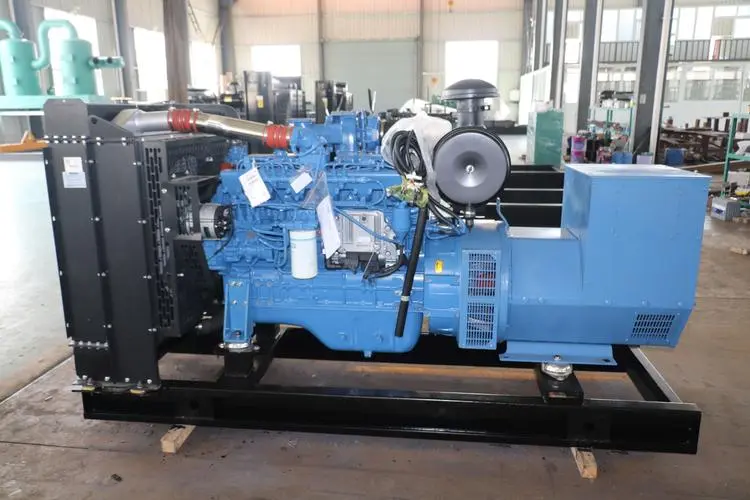Diesel Generators for Islanding Operation Ensuring Reliable Power Supply in Remote Locations

Introduction
In remote locations such as islands, reliable power supply is crucial for sustaining daily life, supporting economic activities, and ensuring safety and security. However, these areas often face challenges in establishing stable connections to the main grid due to geographical constraints or limited infrastructure. In such cases, diesel generators play a vital role in providing a dependable source of power through islanding operation. This article explores the importance of diesel generators for islanding operation, their key components and features, operational considerations, and benefits for remote locations.
Importance of Diesel Generators for Islanding Operation
Islanding operation refers to the ability of a power system to disconnect from the main grid and operate autonomously as an isolated entity. In remote locations such as islands, where grid connections may be unreliable or non-existent, islanding operation using diesel generators becomes essential for ensuring a continuous and stable power supply. Diesel generators are well-suited for islanding operation due to their robustness, reliability, and ability to provide power independently of external factors.
Key Components and Features of Diesel Generators for Islanding Operation
Diesel generators for islanding operation consist of several key components and features that enable them to function effectively in remote locations. The following are some of the essential elements of a diesel generator system designed for islanding operation:
1. Diesel Engine: The heart of the generator system, the diesel engine converts diesel fuel into mechanical energy through combustion. Diesel engines are known for their durability, efficiency, and ability to provide high power output.
2. Alternator: The alternator is responsible for converting the mechanical energy produced by the diesel engine into electrical energy. It generates the alternating current (AC) required to power electrical loads in the system.
3. Control System: The control system of a diesel generator for islanding operation plays a crucial role in monitoring and managing the generator's operation. It includes components such as sensors, controllers, and monitoring devices that regulate the generator's output and ensure its safe and efficient operation.
4. Fuel System: The fuel system of a diesel generator comprises components such as fuel tanks, fuel lines, filters, and pumps that supply diesel fuel to the engine for combustion. Proper fuel management is essential to ensure uninterrupted operation of the generator.
5. Cooling System: The cooling system of a diesel generator helps regulate the temperature of the engine and prevent overheating during operation. visit our website includes a radiator, coolant, water pump, and other components to dissipate excess heat generated by the engine.
Operational Considerations for Diesel Generators in Islanding Operation
Operating diesel generators in islanding mode requires careful planning, monitoring, and maintenance to ensure reliable performance and optimal efficiency. The following operational considerations are essential for successful islanding operation of diesel generators in remote locations:
1. Load Management: Proper load management is crucial to ensure that the diesel generator can meet the power demand of the electrical loads connected to it. Monitoring the load profile, balancing the load distribution, and avoiding overloading are key aspects of effective load management.
2. Fuel Supply and Storage: Maintaining an adequate supply of diesel fuel and ensuring proper storage conditions are essential for uninterrupted operation of the generator. Regular fuel quality checks, tank inspections, and fuel replenishment schedules should be followed to prevent fuel-related issues.
3. Maintenance and Testing: Regular maintenance and testing of diesel generators are essential to identify and address potential issues before they escalate. Scheduled maintenance tasks such as oil changes, filter replacements, and system inspections should be carried out to keep the generator in optimal condition.
4. Monitoring and Control: Continuous monitoring of the generator's performance, fuel consumption, temperature levels, and other parameters is necessary to detect anomalies and take corrective actions promptly. Remote monitoring systems can provide real-time data and alerts for proactive management of the generator.
Benefits of Diesel Generators for Islanding Operation in Remote Locations
Diesel generators offer several benefits for islanding operation in remote locations, making them a preferred choice for ensuring reliable power supply. Some of the key benefits of diesel generators for islanding operation include:

1. Reliability: Diesel generators are known for their reliability and robustness, making them well-suited for operating in remote locations with limited access to the main grid. They can provide continuous power supply even in challenging environmental conditions.
2. Independence: By operating in islanding mode, diesel generators offer independence from external power sources, allowing remote locations to maintain a self-sufficient power supply. This independence is crucial for ensuring uninterrupted operation of critical infrastructure and services.
3. Scalability: Diesel generators can be easily scaled up or down to match the power demand of a particular site or application. This flexibility allows for efficient utilization of resources and optimal performance based on the specific requirements of the location.
4. Fast Start-Up: Diesel generators have the advantage of quick start-up times, enabling rapid deployment of power in emergency situations or during grid outages. This fast response time is critical for maintaining continuity of operations in remote locations.
5. Cost-Effectiveness: Despite initial investment costs, diesel generators offer long-term cost-effectiveness due to their low fuel consumption, high efficiency, and minimal maintenance requirements. They provide a reliable and economical power solution for remote locations.
Conclusion
Diesel generators play a vital role in ensuring reliable power supply through islanding operation in remote locations such as islands. Their robustness, reliability, and independence make them well-suited for providing continuous power even in challenging environments. By understanding the key components and features of diesel generators, considering operational considerations, and leveraging their benefits, remote locations can establish a dependable source of power essential for sustaining daily life and supporting economic activities. Diesel generators for islanding operation are a valuable asset for ensuring energy security and resilience in remote locations.
